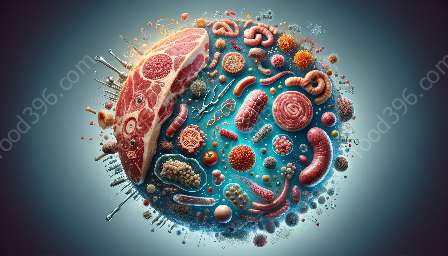Meat fermentation is a traditional method used for preserving meat, and it also enhances its flavor, texture, and nutritional value. This process involves the activity of various microorganisms, leading to complex interactions and transformations in the meat. Understanding the microbial ecology of meat fermentation is crucial for meat microbiology and meat science.
The Importance of Microbial Ecology in Meat Fermentation
Microbial ecology plays a vital role in meat fermentation processes. The interaction between different microorganisms and their enzymatic activities contribute to the development of desirable sensory characteristics in fermented meats, such as flavor, aroma, and texture. Additionally, the microbial community present during the fermentation process influences the safety and shelf-life of the final meat products.
Microorganisms Involved in Meat Fermentation
The microbial communities involved in meat fermentation are diverse and include bacteria, yeast, and molds. These microorganisms are responsible for driving the fermentation process and imparting unique sensory attributes to the fermented meats. Some common microorganisms involved in meat fermentation include:
- Lactic acid bacteria
- Staphylococcus and Micrococcus species
- Pediococcus species
- Molds, such as Penicillium and Aspergillus
- Yeast, including Saccharomyces and Candida species
Dynamic Interactions in Meat Fermentation
The microbial ecology of meat fermentation involves dynamic interactions between different microorganisms. These interactions are influenced by various factors, including the composition of the meat, environmental conditions, and the presence of oxygen. For example, lactic acid bacteria play a crucial role in the initial stages of meat fermentation by lowering the pH through the production of lactic acid, creating an environment conducive to the growth of other microorganisms.
The metabolic activities of these microorganisms result in the breakdown of proteins and fats, leading to the generation of flavor compounds and the preservation of the meat. Furthermore, the competitive and cooperative interactions among the microorganisms contribute to the overall balance and quality of the fermented meats.
Impact on Meat Microbiology and Meat Science
The study of microbial ecology in meat fermentation processes has significant implications for meat microbiology and meat science. Understanding the dynamics of microbial communities and their activities during fermentation is essential for developing safe and high-quality meat products. Moreover, this knowledge enables the optimization of fermentation conditions, leading to the production of meats with consistent sensory attributes and extended shelf-life.
Innovations in Meat Fermentation
Advancements in microbial ecology research have paved the way for innovative approaches to meat fermentation. Scientists and food technologists are exploring the use of starter cultures and tailored fermentation conditions to manipulate the microbial ecology and enhance the quality of fermented meats. Additionally, the integration of molecular techniques, such as metagenomic analysis, allows for a comprehensive understanding of the complex microbial communities present in fermented meats.
These innovations not only contribute to the diversification of fermented meat products but also offer opportunities for the development of functional and value-added meat-based foods.
Future Directions and Challenges
The field of microbial ecology in meat fermentation processes continues to evolve, presenting both opportunities and challenges. Future research endeavors aim to elucidate the intricate relationships within microbial communities and their impact on the sensory and safety aspects of fermented meats. Overcoming the hurdles associated with the standardization of fermentation processes and the regulation of microbial activities poses significant challenges in the field.
Summary
The microbial ecology of meat fermentation processes is a fascinating and essential aspect of meat microbiology and meat science. The interactions between diverse microorganisms during fermentation contribute to the sensory attributes and safety of fermented meats, shaping the landscape of traditional and innovative meat fermentation practices.

